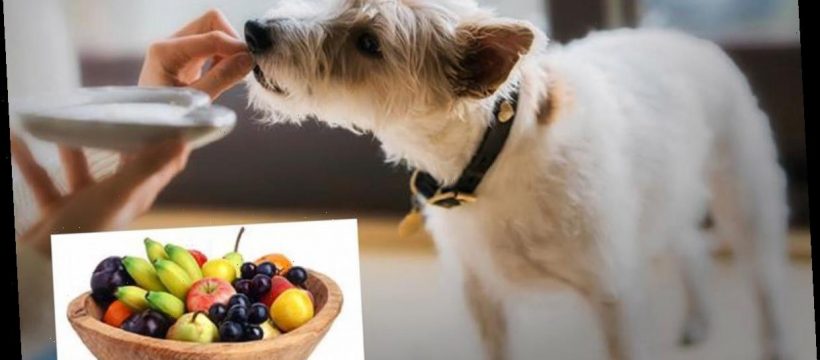LOTS of fruits are tasty nutritious treats for dogs, whose omnivorous systems are designed to digest most of them.
Over half of Brits own a dog and we like to feed them well, so it’s good to know what’s safe to give.
What fruits can dogs eat?
While most fruit is safe for your dog, they should form part of the 10 per cent of their diet reserved for treats.
Many fruits contain a natural sweetener called xylitol which is safe for your mutt but, like sugar, is best consumed in moderation.
Frozen fruits make cooling and hydrating treats for doggies in the summer.
Fruit lollies are also safe for dogs – but beware of added artificial sweeteners.
1. Strawberries
Strawberries are among the safest fruits for dogs, they are very nutritious and generally loved by canines.
Strawberries help with a dog’s immune system, energy levels, and nerve and muscle function because they contain high levels of vitamin C, manganese and potassium.
Although soft and sugary, strawberries contain an enzyme which is thought to whiten dog’s teeth.
2. Blackberries
Blackberries are probably the next best for your dog, they are a good source of vitamin K.
The berries are also low in calories and sugar.
3. Blueberries
Blueberries are considered a superfood, and are very good for your dog and safe to feed.
Adding them to your pet's diet is a great way to keep them healthy as they contain antioxidants, fibre and vitamins C and K.
4. Raspberries
Raspberries are safe for your dog too, but very sugary, so perhaps a little less of these.
But they are high in fibre, which is a plus.
5. Apples
Apple is very good for your dog, and adds texture to their diet.
Take out the core, because apple pips contain cyanide.
It won’t matter if your pup swallows a couple , but is a risk if pips are chewed.
Apples benefit your dog’s skin, bones, teeth, gut and immunity, because they contain vitamins A and C, calcium, phosphorus, and fibre.
As well as being safe and tasty, some even say apples can help to combat doggie breath, and biting them can clean teeth.
6. Pears
Pears, like apples, are safe and healthy to feed to your dog.
They are high in copper, vitamins C and K, and fibre, but as with apples, make sure your dog doesn't chew the pips.
7. Nectarines
Nectarines are great for your pooch’s skin, teeth, bones and gut.
They provide good concentrations of beta carotene and vitamin A, potassium and fibre.
8. Peaches and mangoes
Large-stone fruit such as peaches and mangoes are also safe to feed to your dog, but not the stones.
They should only be given in small amounts – and no tinned peaches either!
9. Bananas
Bananas make a good treat, and they have an interesting texture for your dog to enjoy when fresh or frozen.
They are low in cholesterol and sodium, and contain loads of vitamins, biotin, fibre, and copper.
Vitamins and minerals in bananas are said to support healthy teeth and claws, good nerve and muscle function, and a healthy immune system.
On a note of caution, bananas are high in calories, so pay attention to the 10 per cent of your doggy’s diet being from treats, of which bananas are only a part.
10. Cranberries
Cranberries are good for your dog, so safe to give, but they are quite bitter so many dogs don’t like the taste.
They are often found in their dried form, which contains added sugar, detracting a little from their health benefits.
And beware because too many cranberries can upset a pooch’s tummy.
11. Melon
Melon is safe for your dog to eat, but is one of the very sugary fruits.
Just feed the flesh, not rind or pips.
12. Oranges
Oranges are rare among citrus fruits as they are safe to give to your dog, just not the rind.
Other citrus fruits such as lemon and lime should be avoided, as dogs rarely like the taste and they can cause digestive issues.
13. Tomatoes
Dogs can eat tomatoes, whether or not you agree that they are a fruit, but feed these sparingly, because they contain a substance called solanine, which is not particularly good for dogs.
Solanine is found in high concentrations in the leaves and stems of tomato plants, and in green tomatoes, so keep these away from your dog.
14. Pineapple
Pineapple is safe for dogs but, again, should be limited because of the high sugar content.
Canned pineapple should be avoided because of the syrup they are immersed in.
What fruits can’t dogs eat?
1. Grapes or raisins
Grapes and raisins keep these away from your dog and contact a vet if your furry friend gets hold of any by accident.
Although some people give their dogs grape seed extract as a supplement, grapes are very poisonous for dogs and should be kept away from them.
Grapes damage dogs’ kidneys, and can cause vomiting, diarrhoea, tiredness or weakness.
2. Cherries or plums
Cherries and plums may be similar to some fruits your dog can eat, but it is recommended to avoid them.
The risk is really the stone, which is hard to avoid in a cherry, and is toxic to dogs.
3. Pips, stones or rind
Pips, stones and rind should be avoided in most cases.
This applies to fruit such as apples, nectarines, melons, oranges and banana skins.
4. Avocados
Avocados contain persin, which can poison a dog and causing vomiting, diarrhoea or an inability to poo.
5. Citrus fruit
Citrus fruits such as grapefruit, and only a small amount of lemon or lime juice is safe.
Dog’s fed citrus fruits are likely to suffer sickness and/or diarrhoea – no fun for anyone.
As mentioned before, dogs are unlikely to enjoy the taste of citrus fruits.
Source: Read Full Article





